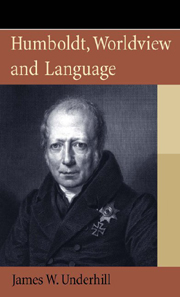Book contents
- Frontmatter
- Contents
- Acknowledgements
- Preface
- Part I Language and World
- Part II Humboldt, Man and Language
- 7 Worldview (Weltanschauung or Weltansicht)
- 8 Sprache
- 9 The Work of the Mind
- 10 Form
- 11 Creativity, Culture and Character
- 12 Catching the Character
- 13 A Seeing and Feeling Worldview
- 14 Four Dangers in the Comparative Approach
- 15 Reformulating the Worldview Hypothesis World
- 16 A Final Word
- Glossary
- Bibliography
- Index
10 - Form
from Part II - Humboldt, Man and Language
Published online by Cambridge University Press: 12 September 2012
- Frontmatter
- Contents
- Acknowledgements
- Preface
- Part I Language and World
- Part II Humboldt, Man and Language
- 7 Worldview (Weltanschauung or Weltansicht)
- 8 Sprache
- 9 The Work of the Mind
- 10 Form
- 11 Creativity, Culture and Character
- 12 Catching the Character
- 13 A Seeing and Feeling Worldview
- 14 Four Dangers in the Comparative Approach
- 15 Reformulating the Worldview Hypothesis World
- 16 A Final Word
- Glossary
- Bibliography
- Index
Summary
Mental activity, the work of the spirit, forms language, and because ‘the existence of spirit as such can be thought of only in and as activity’ (Humboldt 1999: 49), it follows that language is constantly being fashioned and refashioned. Linguistic study obliges us to dismember the structure (Bau) of languages, though Humboldt reminds us that this dissection should not delude us into thinking that we have touched the essential core of a language when we manage to speak of its grammar and its structure. Humboldt suggests that linguistic study should rather view each language as ‘a procedure advancing by specific means to specific goals, and to that extent really to view them [languages] as fashioned by nations’ (1999: 49). Once more, the word fashioned translates (in Heath's version) a key term for Humboldt. Humboldt expresses this idea as the Bildungen der Nationen (the cultivation of nations, or, rather, the cultivation by nations).
The cultivation of the nation is advanced by the cultivation of individual concepts by individual men and women. Here, nation is defined not in the nationalistic terms it has come to be associated with since the Second World War and the rise of fascism, but quite simply as a body of people marked off by common descent, language, culture, or historical tradition. What is often considered in terms of a power relationship between man and society, is conceived by Humboldt in terms of a dynamic interaction among men and women which culminates in generating a nation.
- Type
- Chapter
- Information
- Humboldt Worldview and Language , pp. 74 - 80Publisher: Edinburgh University PressPrint publication year: 2009

